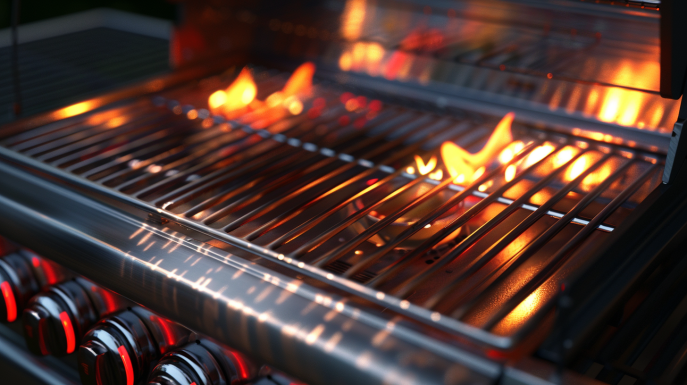In the BBQ world, there are two primary cooking methods: Gas and Charcoal. Loyal followers often pit one against another. Charcoal delivers versatility! Gas gives you control. Charcoal guarantees flavor! Gas provides simplicity. With all this confusion, how does one simply choose a grill? In this blog, we're going to go over the pros and cons of each grill type as well as cleaning and general tips to keep your desired grill healthy and beautiful.
Gas Grills
Gas grills are a favorite among many. People use gas grills because of their convenience and simplicity. Unlike charcoal, gas grills provide instant heat to your food. You don't have to wait for the charcoal to heat up, therefore saving time in the process. Moreover, gas grills make cleanup a breeze as they often provide drip trays and eliminate the process of cleaning up your ash after the fact. Additionally, maintaining stable levels of heat is a no-brainer when it comes to gas grills. Turning your knob to desired temperatures makes controlling your grill temps feel like a walk in the park.
Charcoal Grills
Charcoal grills are many people's go-to grill types. They are more affordable than gas grills since there's no need to pay for the extra gas lines or equipment needed to keep gas grills going. Since charcoal grills have no limit to their temperature range, the user can reach temperatures that most gas grills can't manage. By simply moving the charcoal around underneath your cooktop, you can create direct heat and indirect heat areas all on the same grill.
Charcoal grills are also known for their intense flavor and juiciness. This wonderful flavor is created from the charcoal smoke carrying the juice drippings back into your meats as they cook.
Grill Grates

A key factor in grill-buying decision-making should be analyzing your desired grill grates. Do you want to achieve those attractive sear marks on your food? Do you want something reliable? What about easy to clean? Let's figure this out before you get too overwhelmed, shall we?
Grill grates are essential components to determining a good grill as this is what food comes in direct contact with. Grates should keep great heat preservation, be easy to clean, and last you a while.
Stainless Steel
One option is stainless steel. Stainless steel grill grates are affordable and lightweight, making mobility easy whilst you correct your charcoal beneath. Yet, the thin grates mean little heat retention. Over time if not taken care of properly, the stainless steel will wear down and be prone to food sticking.
Cast Iron
Another great type is cast iron. Cast iron is excellent in the heat retention department and will give you the bold sear marks you're looking for. They are very reliable when taken care of properly. If not, you're in for a trip. However, cast iron grill grates are heavy and will have you cleaning them more often than you'd like. Because of the material, cast iron is prone to rust. Cast iron needs to be carefully and regularly maintained to keep this from happening. The proper way to care for cast iron is to clean off residue immediately after you take food off the grill. While the cast iron is still warm, spray with oil to fill pores that opened whilst cooking. Many people don't understand the maintenance that is required for any type of grill, so we've laid out a few of them for you.
Cleaning Techniques
Whether you're buying your first grill, or you're updating your old grill, there's a baseline of knowledge you need to know about the maintenance of grills.
Immediate Attention
Firstly, you must treat them with the same level of respect you have for your cookware. Cookware needs to be cleaned immediately after the food is cooked to prevent sticking and the inevitable frustration whilst trying to scrape off your 2-day-old egg rust. The same goes for your grill. Similar to nonstick pans, grills need specific tools to keep clean: grill brushes. Use grill brushes to remove food left behind after grilling.
Before you decide to start up your backyard BBQ, give your grill a good wipe down with some soapy water. You don't want the dust and other particles getting mixed with your food whilst you cook.
Wipe Down
Secondly, understand the type of grill grates you have and buy your cleaning supplies accordingly. Steel brushes are designed for your petite and highly sensitive stainless steel grates in that they have thinner and added bristles to scrape off food particles. Grill bricks are preferred on grates such as cast iron, which can withstand the pressure and roughness.
Keep the Critters Out!
In between uses, keep your grill free from food to keep the critters out. Nobody likes bugs in their food. Additionally, spiders are known for hiding in gas pipes. If your grill isn't working properly, give your pipes a clean to clear out any webs.
Proper Aftercare
When your Backyard BBQ is said and done, instead of closing the grill and calling it a night, spend an extra 10 minutes cleaning it out. One tried and true method is to increase the heat of your grill to max temperature. This will burn off any excess food particles left after cooking, and will make cleaning a breeze. Make this a regular habit of yours after every use to give your grill a long life.
